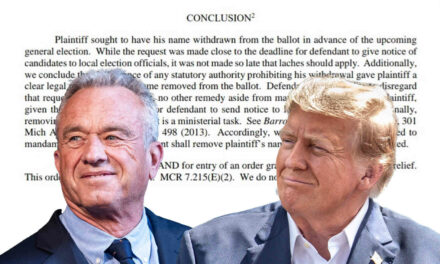We support our Publishers and Content Creators. You can view this story on their website by CLICKING HERE.
You guys, the Canadian military is totally serious with this intersectional feminist report on how space is sexist and racist, and I cannot stop laughing.
Yes, the Canadian military spent $30,000 on this report. They’re not a serious country.
As Canada prepares to send an astronaut on the first manned moon mission in more than 50 years, its own military has commissioned a $32,250 report on how space exploration may actually be ‘racist, exploitative, elitist, and environmentally destructive.’
The 48-page report, entitled Hidden Harms: Human (In)security in Outer Space, concludes that human usage of space is currently ‘masculine, militarized and state-based.’
The authors also bemoan a space exploration field that is beholden to colonial concepts such as ‘technospeak’ and ‘expertise,[‘] and which doesn’t give appropriate weight to ‘spirituality, astrology, and cosmology, the last of which views celestial bodies in space as animated beings and not mere objects.’
Here are some fun highlights of the report:
Limitations of current approaches
Discussion and survey responses yielded detailed reflections on the limitations of existing approaches to space security and governance. The following concerns were raised:
Existing approaches are ahistorical and thus invisibilize diverse stakeholders and voices, including the role of women and representatives from the Global South in shaping contemporary space law and governance.
These approaches ignore the role of power and inequality in structuring space activities and infrastructure, both past and present.
Existing approaches are gender-biased. The language of major treaties, resolutions, and other international instruments related to outer space is highly gendered and biased toward males. Terms such as ‘mankind’, ‘astronauts and envoys of man-kind’, ‘man’s entry into outer space’, ‘manned and unmanned stations
Yes, ladies and gentlemen, everybody knows that we cannot successfully explore the cosmos with this gendered Western language that we currently use. Only when we use terms like “humankind” will we be able to make any strides in space exploration.
Environmentalism and ecology
There was significant discussion on the need to prioritize environmental concerns and ecological approaches to governance in outer space, focusing on the ecological stability of the outer space environment and human responsibilities for care of this environment. Survey responses noted that ecological feminism can be useful to understand and analyze how the oppression of women is linked to the oppression of nature in a society dominated by patriarchal norms, and how their liberation is similarly linked. Pointing to examples in other fields that can be adapted to outer space, environmental justice was offered as an effort in which feminist and intersectional perspectives have been incorporated. It was noted that environmentalism has also become gendered; studies indicate that those who identify as men tend to shy away from environmental discussions, which are perceived to undermine masculinity. It is possible that including diverse gendered voices and perspectives in conversations related to outer space could lead to environmental considerations being taken more seriously.
Yes, how about a Green New Deal for space, ey?
The consultation also pointed to the relevance of incorporating additional governance frameworks into international approaches to peace and security in outer space. Those mentioned include:
Women, Peace, and Security agenda,
the United Nations Sustainable Development Goals,
Convention on the Elimination of All Forms of Discrimination Against Women (CEDAW),
UN Declaration on the Rights of Indigenous Peoples (UNDRIP),
international legal frameworks related to human rights and environmental protections.
Notably, these frameworks were almost entirely absent from discussions of relevant governance frameworks at the United Nations Open-Ended Working Group on Reducing Space Threats.
When they speak about “indigenous peoples” do they mean, like, aliens?
I’m getting real “Avatar” vibes from this one!
While it is important to increase opportunities for women to participate, it must be recognized that not all women think alike or share the same values and experiences. Discussants noted other aspects of identity and experience that must be acknowledged:
Black voices in particular have been marginalized.
There are more than two genders
Gender is experienced differently in the Global North and South.
Diversity at every level must be sought-within national delegations, among ex-perts/presenters, at side events, etc.
Youth must be included.
Participants were clear that opening the door is not enough. The systematic exclusion of marginalized groups must be countered with efforts that actively find and bring in these voices by reaching beyond national delegations and industry. In many countries, women and other minorities are excluded from both, particularly when high levels of technology are involved. Greater civil society engagement is one way to reach more underrepresented groups.
“There are more than two genders.”
Back to the Western language nonsense:
Gendered language
The main space-related treaties invisibilize women through ‘manned’ language; women must imagine themselves within masculine constructs. UN-specific language often refers to the position of the UN Secretary-General as ‘him’ and to the ‘Chairman’ of various UN bodies. While such bias can be corrected with gender-neutral language – ‘humankind’ and ‘crewed’ spaceflight – participants noted that contemporary UN resolutions as recent as Further practical measures for the prevention of an arms race in outer space of 2019 and Destructive direct-ascent anti-satellite missile testing of 2022 have used ‘mankind.’
Colonial language
The language of space activities is also heavily colonialized, using terms such as ‘colonizing’ space and representing space as a ‘frontier’ or ‘wild west.’ This language underpins practices that participants characterized as racist, exploitative, elitist, and environmentally de-structive. Appropriate language must include terms such as ‘space exploration’ and ‘living in space’ but also the expressions of humanity found in Article I of the OST.
Bro, these people cannot be serious!
We’re talking about space exploration here, not some elective at San Jose State.
I’ll give you their conclusion here and I gotta go, cuz this is beginning to waste my time.
Leadership is needed to help bring down the barriers that still prevent large swaths of the world’s population from participating and influencing space activities, governance, and decision-making. Leadership is needed to bring questions about gender, race, class, ability, and sexuality from the margins to the centre of these processes, including those concerned with arms control and norms of responsible behaviour in outer space. And leadership is needed to normalize inclusion of different perspectives.
Most importantly, intersectionality requires not only acknowledging these differences but creating the space to learn from them. Leadership requires listening.
Look for Canada to continue to be the last country you ever think of when it comes to space exploration.
They continue to represent themselves as nothing more than a joke when it comes to serious issues.
P.S. Now check out our latest video 👇
Keep up with our latest videos — Subscribe to our YouTube channel!

 Conservative
Conservative  Search
Search Trending
Trending Current News
Current News 





